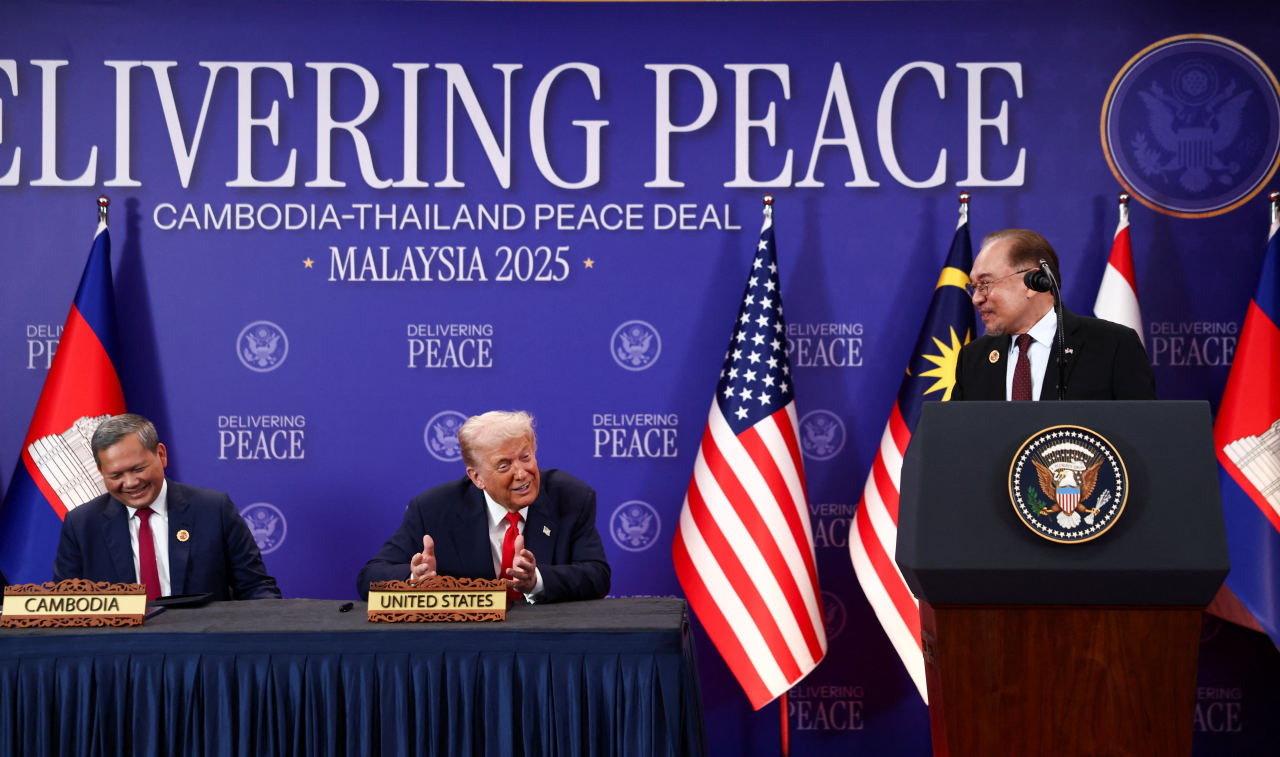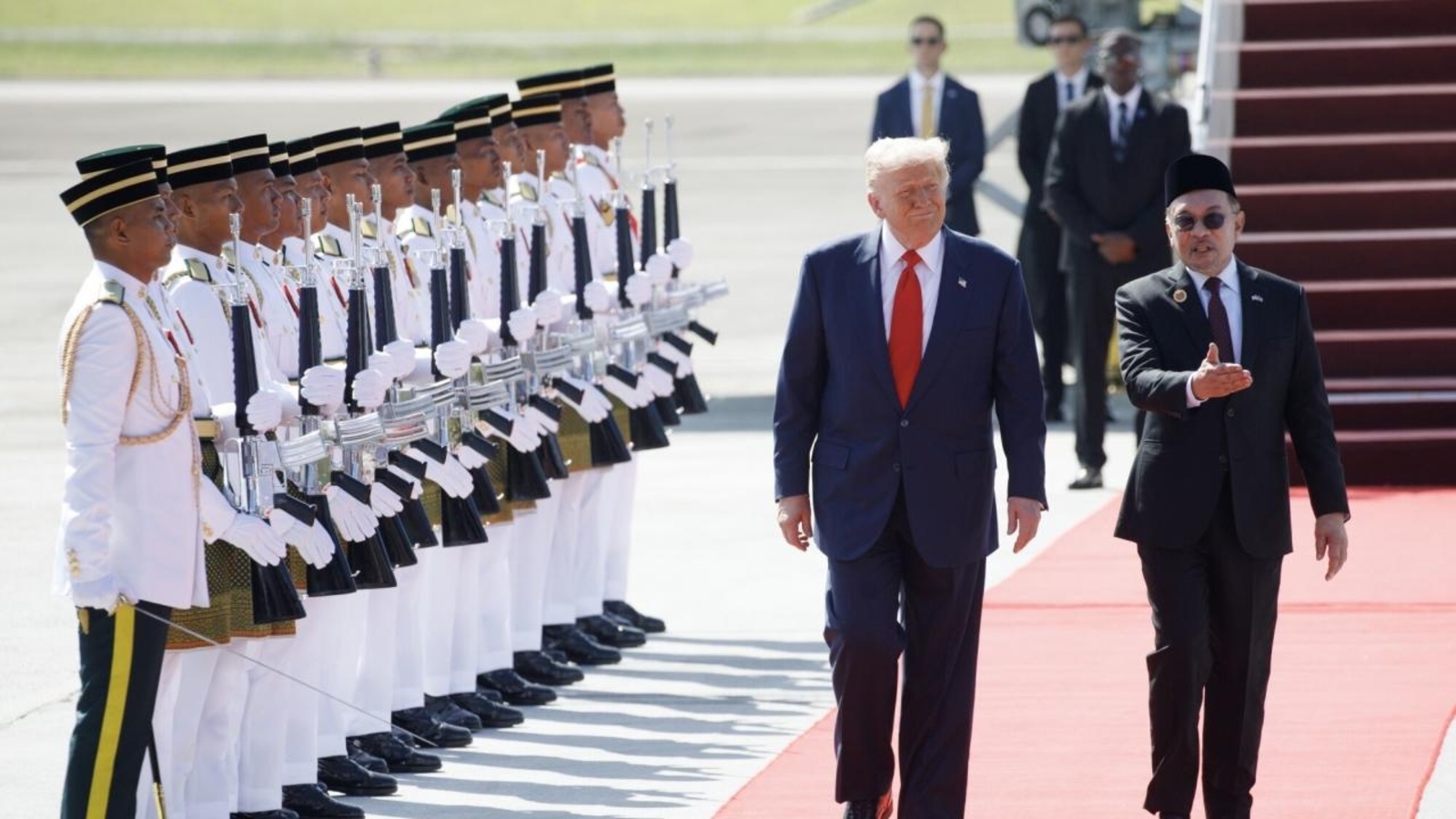KUALA LUMPUR, Malaysia—World leaders have developed something of a blueprint for President Trump when he comes to visit: produce a lavish welcoming ceremony and launch a charm offensive in hopes of securing relief from U.S. tariffs and demands to spend more on defense.
Recent overseas trips have involved escorting Air Force One with jet fighters during its final approach and lining red carpets with uniformed soldiers and traditional dancers. Upon Trump’s arrival, foreign hosts often exalt him for his role in reaching a significant trade or peace deal. There have been repeated pledges to nominate the president for the Nobel Peace Prize.
Foreign leaders have long used presidential visits to curry favor with the man in the Oval Office. However, Trump has, more than many of his predecessors, used the economic and military might of the U.S. to put pressure on and extract concessions from countries around the world, upping the stakes for leaders to find their way into the president’s good graces.
The emerging diplomatic script was on full display Saturday in Kuala Lumpur. Malaysia sent an F-18 to flank the president’s plane before it landed at the city’s airport. Anwar Ibrahim, Malaysia’s prime minister, awaited the president at the bottom of the stairs alongside troops and dozens of dancers. Trump even joined in the festivities, pumping his fists and swaying to the rhythm of the music and then waving the Malaysian and U.S. flags in unison.
The president added his own flourish by welcoming Anwar into his presidential limousine, known as “The Beast,” before speeding together to a summit of the Association of Southeast Asian Nations here.
“When the president arrived, he asked me to join him in the car. I said, ‘That’s against the security of protocol rules,’ and he was delighted to break the rules,” Anwar said as he regaled an audience soon after. “It was a nice ride.”
Moments later, at the signing of a peace deal between Cambodia and Thailand the U.S. helped finalize, Cambodian Prime Minister Hun Manet said Trump deserved the Nobel, while Anwar lauded Trump for “your tenacity, your courage.”
Cambodia and Thailand clashed in July over a long-running border dispute. Trump threatened to suspend tariff relief if they didn’t reach a cease-fire, pressuring the two countries’ leaders into talks mediated by Malaysia.
The pageantry, which echoed similar ceremonies that welcomed Trump in the Middle East earlier this year, shows how U.S. partners try to flatter and sway the U.S. president. To succeed, world capitals carefully track comments from Trump and those around him for topics that can land them in the president’s good graces, officials from multiple countries have said.
The pomp and circumstance, at times beyond what other U.S. presidents have enjoyed, shows that many nations now put as much thought into the airport reception and summitry as they do into policy deliverables when Trump comes to town.
But it has also underscored the stakes for any future trip, as every country feels pressure to orchestrate a lavish event that rivals the others, creating a sort of hospitality arms race for any Trump visit. At the same time, the president’s counterparts have to balance pleasing Trump with messaging strength to their own constituents.
The Malaysian government did not respond to a request for comment.
“President Trump has effectively restored America’s standing as leader of the free world, and foreign nations are enthusiastic to strengthen their relationships with our country under this President’s leadership,” wrote Anna Kelly, a White House spokeswoman.
Kuala Lumpur, Trump’s first stop, set the tone for the weeklong Asian swing. Southeast Asian leaders who were gathered here cottoned on to Trump’s desire to present himself as global peacemaker. The American president got the first word at a signing ceremony for an agreement that ended five days of border clashes between Cambodia and Thailand that killed dozens of people and displaced thousands.

“I love doing it,” Trump said of his efforts to resolve conflicts. “I shouldn’t say it’s a hobby, because it’s so much more serious than a hobby. But it’s something that I’m good at, and it’s something I love to do.”
In a news conference after the signing ceremony, Sihasak Phuangketkeow, Thailand’s foreign minister, said the deal wasn’t actually a peace treaty that resolved the politically sensitive and century-old border dispute between his country and Cambodia. Instead, the leaders signed a “joint declaration” on the outcomes of their meeting in the Malaysian capital. “I would call it a pathway towards peace,” he said.
Sihasak also said that the agreement wasn’t the result of “third party mediation”—an apparent reference to the U.S.
The challenge now falls to Japan, where Trump on Monday will sit for a courtesy call with Emperor Naruhito. The next day Trump is likely to enjoy a warm reception by new Prime Minister Sanae Takaichi and attend a grand dinner with prominent business leaders. Meanwhile, South Korea has the challenge of hosting Trump in a noncapital city, Busan, before he attends the Asia-Pacific Economic Cooperation summit in a much smaller one, Gyeongju.
The two governments have already pledged to increase military spending and invest nearly $900 billion in the U.S. as they work to secure their trade and security relationship with Washington.
Write to Alexander Ward at alex.ward@wsj.com, Gabriele Steinhauser at Gabriele.Steinhauser@wsj.com and Meridith McGraw at Meridith.McGraw@WSJ.com


